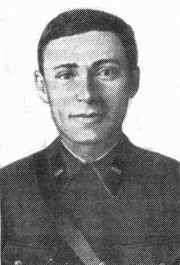
Abram Temnik
Abram Temnik was born into a working-class Jewish family in the village of Chernigovka, in the Zaporozhie Region of Ukraine, in 1907.
After completing a 7-year school, he worked as an assistant train driver for a mill, and then as a skilled worker at a dairy.
He joined the Red Army in 1929. Temnik graduated from a military-political school in 1937. In 1939, while serving as a political instructor, he participated in the fighting at the Khalkhyn Gol River in Mongolia.
He met the outbreak of the German-Soviet war on the Western Front as the deputy commander of a brigade that succeeded in destroying 80 enemy tanks in Belorussia.
Abram Temnik headed artillery units at observation posts. He was wounded twice, but remained on active service. After leaving hospital, he was appointed commissar of a regiment. In December 1942 he was promoted to the rank of colonel.
Temnik participated in defensive operations in Belarus, in Smolensk, in the Caucasus, in the battle of Stalingrad, and in tank attacks during the liberation of Oriol, Bryansk, and Lvov.
In 1943, he graduated from a higher military-political course and, in 1944, he studied for six months at the Military Academy for Armored and Mechanized Troops. Subsequently, Temnik was appointed commander of the 1st Guards Tank Brigade.
Before other tank brigades withdrew to the Vistula River, the brigade led by Temnik succeeded in and holding the captured enemy positions. Then his brigade rapidly traversed westward over 450 kilometers, capturing more than 1,000 places. His brigade also played an important role in freeing Red Army units that had been surrounded by the enemy in the fortress city of Poznań. Temnik was twice recommended for the title of Hero of the Soviet Union for his brilliant conduct of the latter operation, but was only awarded lesser honors. The first time the headquarters of the Army lowered the award to the Order of Lenin and, then, the headquarters of the Front lowered it further -- to the Order of Bogdan Khmelnitskii, 2nd Class. The second time the decision to lower his award was taken in Moscow, which decided that he be awarded only the Order of the Red Banner. It is not clear whether it was the fact that Temnik's Jewish origin led to his receiving the lesser honor since it was a common practice at the time to award lower honors than those originally recommended. Another possible factor was Temnik's personality. As noted by Veniamin Mindlin, one of his officers and a fellow Jew, "Temnik was brave to a fault and very touchy. He tended to be quite sensitive to remarks of his superiors." (Mindlin, "Poslednii boi – on samyi trudnyi," Znamia, No. 4, 1985).
When the Commander of the Front Marshall Zhukov ordered the Commander of the 1st Guards Tank Army General Katukov to select the unit to enter Berlin, Katukov chose the 1st Guard Tank Brigade, which succeeded in breaching the defenses of Berlin on April 21, 1945.
In his book Encyclopedia of Jewish Heroism Fedor Sverdlov described this event as follows:
"The major attack took place in the area of the Anhalter train station, on Gneisenau Street. Without artillery support, the tank crews suffered heavy losses. Abram Temnik led a group of tanks to the Reichstag on April 28. The tanks advanced, but suddenly their commander's tank exploded when it set off a landmine. Seriously wounded in the stomach, Temnik continued to command his men until he was evacuated to a hospital." 1
Temnik died from his wounds on April 29, 1945. Within the short period between April 16 and April 28 Temnik's tank brigade killed 1,250 enemy soldiers, put out of action 54 machine-gun positions and 104 enemy guns, and captured 23 guns, 9 tanks, and 56 prisoners.
Abram Temnik was reported to have been buried in the Tiergarten in Berlin. However, there is some evidence to the effect that he was buried in a mass grave in the town of Liebenau (now Lubrza, Poland).
On May 31, 1945 Guard Colonel Abram Temnik was posthumously awarded the title Hero of the Soviet Union for his exemplary command of his tank brigade during the Berlin operation and for his personal heroism. Overall, he was awarded the Order of Lenin, the Order of the Red Banner – three times, the Order of Bogdan Khmelnitskii, 2nd Class, the Order of the Red Star - twice, and various medals.
A school was named in Temnik's honor in his native village of Chernigovka, as well as a street in the town of Kopeisk in the Cheliabinsk Region.
- 1. Encyclopedia of Jewish Heroism Fedor Sverdlov p.303






